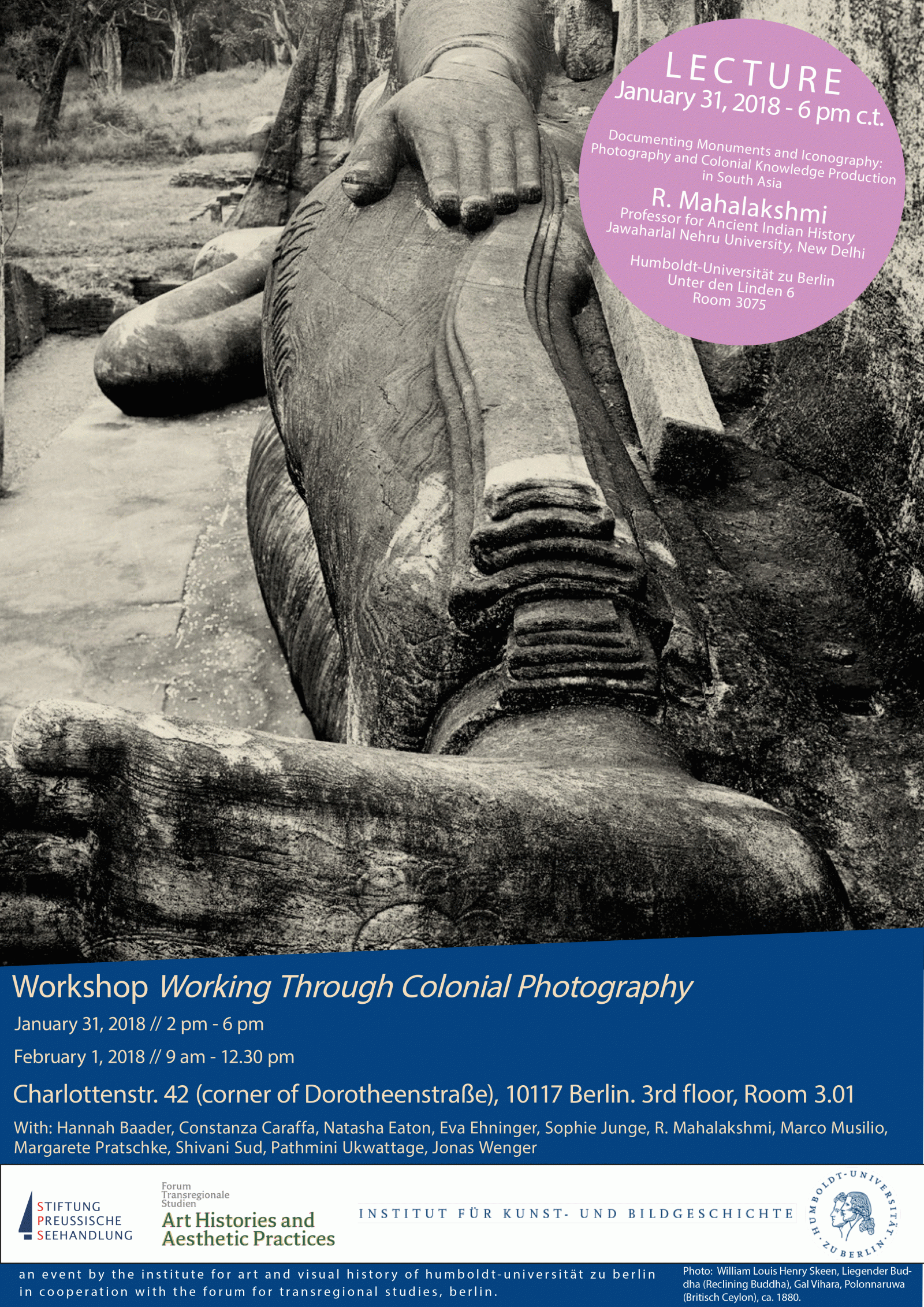Workshop
Working through Colonial Photography
organized by Hannah Baader (Forum Transregionale Studien, Berlin/Kunsthistorisches Institut in Florenz - Max-Planck-Institut), Eva Ehninger (Humboldt-University, Berlin), Pathmini Ukwattage (Basel University)

The doubled (and troubled) status of photographs produced in the nineteenth and early twentieth centuries for the purposes of delimiting, defining, categorizing and ordering colonial territories and their inhabitants as documents of both the realities of life under colonial rule and as expressions of colonial ideologies has been noted and discussed (e.g. Behdad/Gartian 2013; Pinney 2011; Edwards 2001). At the same time, archives of colonial photography remain extremely valuable resources, as they provide us with a wealth of imagery of cultural artefacts and social interaction that would not exist were it not for the colonial mania to document and collect. This workshop asks how our methodological tools need to be adjusted to the handling of this material in order to do justice to its visual wealth as well as its structural opacity, its deliberate omissions, conscious rearrangements and colonial points of view.
Photography, applied to produce scientifically valuable knowledge about the colonial empire, is an epistemological instrument within a set of "investigative modalities" (Bernard S. Cohn). This instrumentalisation turns photographs into "complex discursive objects of colonial power and culture," as Hight and Sampson have pointed out (Hight/Sampson 2002). It is this complexity that has made photography a viable means to question, contest, resist or even destabilize the colonial order. This leads us to ask: In which cases has photography failed to explicitly represent the colonizers’ interests? Where can we find subversive uses of photography? Where and how has photography operated within contexts of resistance? Our aim is to gain an altered view on photography in the colonial context in which the affiliation to power is not negated but bracketed, in order to think beyond the dichotomy of oppressor and oppressed, observer and observed – a binary structure which seems to be inherent to the photographic dispositive.
Within the broader field of visual representation of Western colonialism, the relation between photography and its subject matter is key to an understanding of image politics and processes of knowledge production, which are built on a rhetoric of essentialization and the definition of differences. A focus on photography's specific characteristics may serve as a fruitful methodological tool for the critical analysis of this relation. Due to its "medium condition" – its indexicality, possibilities of reproduction and distribution, its presumed objectivity, its function as a surrogate, the intimate relationship of the tactile object to its respective beholder etc. – photography maintains a specific relation to its pictorial content. The medium's own mechanism is at work in constructing its object of representation.
Besides the above-mentioned approaches there are other methodological concerns to be taken into account in working through colonial photography. These include the focus on a photograph's material histories and its physical inclusion into all kinds of different archival contexts; the choice of "exemplary" images from a larger collection; or the disclosure of a photograph's or archive's blind spots. They all point toward art history and visual studies as a transcultural practice — an activity rather than a label, that is just as involved in processes of negotiation, translation and attribution as photography itself.
Downloads
Kooperationspartner
in collaboration with
with generous support from
31. Januar – 01. Februar 2018
Charlottenstraße 42 (corner of Dorotheenstraße)
3rd floor, Room 3.01
10117 Berlin
Hinweis
Diese Veranstaltung wird durch Fotografien und/oder Videoaufnahmen dokumentiert. Falls es nicht Ihre Zustimmung findet, dass das Kunsthistorische Institut in Florenz Aufnahmen, auf denen Sie erkennbar abgebildet sein könnten, für die Veranstaltungsdokumentation und Öffentlichkeitsarbeit (z.B. Social Media) verwendet, bitten wir um eine entsprechende Rückmeldung.


